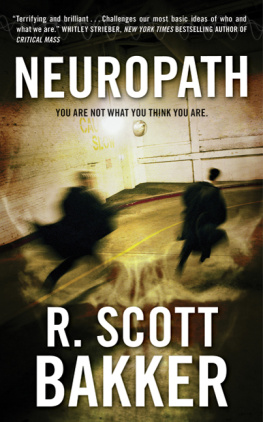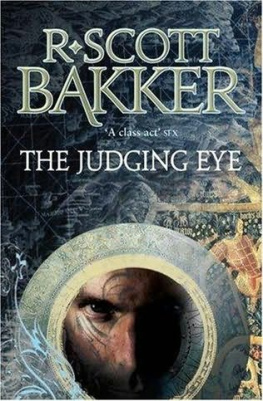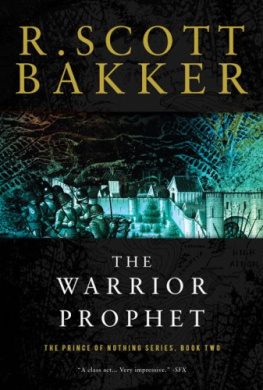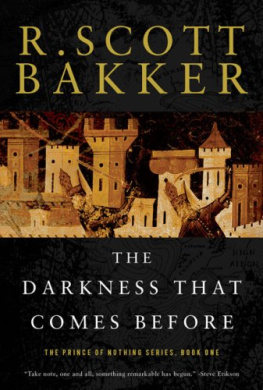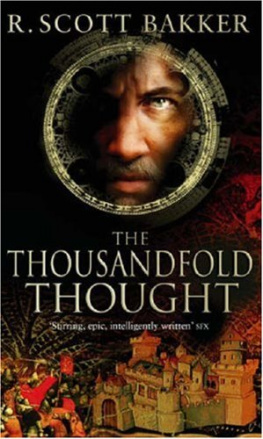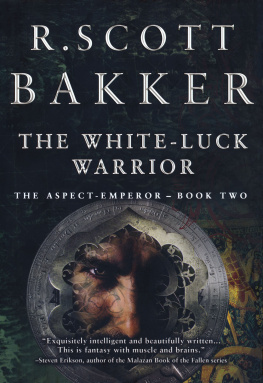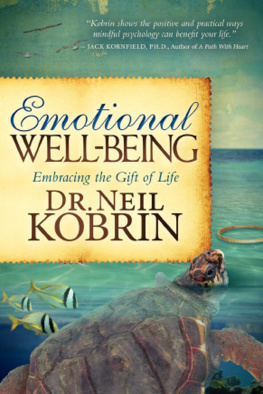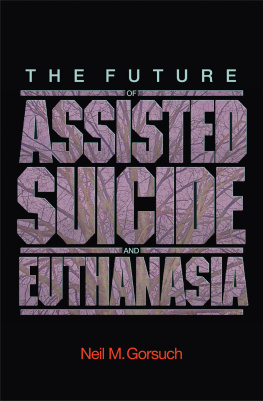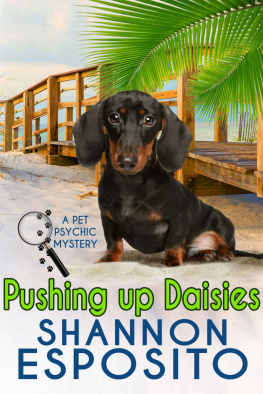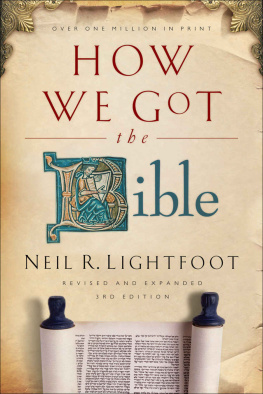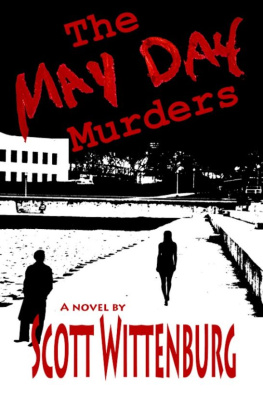, a trilogy that Publisher's Weekly calls 'a work of unforgettable power'.
He spent his childhood exploring the bluffs of Lake Erie's north shore, and his youth studying literature, languages, and philosophy. He now lives in London, Ontario, with his wife, Sharron, and their cat, Scully.
R. Scott Bakker
Copyright R. Scott Bakker 2008
The right of R. Scott Bakker to be identified as the author of this work has been asserted by him in accordance with the Copyright, Designs and Patents Act 1988.
All rights reserved. No part of this publication may be reproduced, stored in a retrieval system, or transmitted, in any form or by any means, electronic, mechanical, photocopying, recording or otherwise, without the prior permission of the copyright owner.
All characters in this book are fictitious, and any resemblance to actual persons, living or dead, is purely coincidental.
A CIP catalogue record for this book is available from the British Library.
The Orion Publishing Group's policy is to use papers that are natural, renewable and recyclable products and made from wood grown in sustainable forests. The logging and manufacturing processes are expected to conform to the environmental regulations of the country of origin.
To my Fall 2003 Popular Culture class.
For remaining honest in the face of complexity, and humble in the shadow of mystery.
ACKNOWLEDGEMENTS
This book was born out of a bet with my wife, Sharron, whose sharp eye and loving skepticism have shaped the story at every turn. If a book this dark could have godfathers, they would be my brother, Bryan Bakker, who held the rope as I crawled down the rabbit hole, my agent, Chris Lotts, who despite the Argument insisted on asking 'But why?' at every damn turn, and Gary Wassner, who taught me, among so many other things, that complicated fathers were the best fathers of all.
Those who have been instrumental in finessing the book include Jon Wood at Orion Books, Barbara Berson at Penguin Canada, Roger Eichorn, Frank Cameron, Chris O'Brien, and Chris Viger at the University of Western Ontario, who was gracious enough to let me attend his graduate seminar in the spring of 2006.
Among the innumerable friends and acquaintances who have left their mark, I should mention Karl Schroeder, Rick O'Brien, Lisa Rusal, Brian Ribeiro at the University of Tennessee, Nandita Biswas at the University of Western Ontario, Nick Smith at the University of New Hampshire, Danielle Gagne at Alfred University, and the painfully erudite members of my reading group, especially Whitney Hoth, who prefers 19th-century literature for a reasongood or bad nobody seems to know.
Thanks to you all.
AUTHOR'S NOTE
The following story is based on actual trends in neuro-science, psychology, and cognitive science. Despite all the controversies (and there are many), one fact has managed to rise above the fray: we are not what we think we are.
From whence did Dante take the materials for his hell but from our actual world? And a very proper hell he was able to make of it.
SCHOPENHAUER
You should know better.
After all, you're watching it on the news: the diagonally parked cruisers, the milling officials who glance and scowl in your direction. You see the cordons, the lengths of sagging tape, and without thinking you know that there, on the far side, lies something horrific, the residue of something too wicked for general consumption. There, you understand, is the crime scene .
A place where human meat turns chill.
'The Chiropractor,' the newsmodel says, 'continues to terrorize New Yorkers.'
You shudder when you hear that, because you are a New Yorker. The image flickers to Mrs Alvarez, the generic neighbor, who weeps at the loss of someone so special, so beautiful. She looks like a good woman, so you empathize. You do the mental math, calculating the distance between Mrs Alvarez and your house, and you think of calling a friend. Didn't you go to a restaurant just around the corner from there?
You look at the phone lying next to your keys on the kitchenette. You want to call someone, but you curl your feet into your hands instead, run your thumbs over the polish on your toes .
The poor girl, you think. You scowl, trying to envisage the horrific truth behind the NYPD spokesperson and her facade of euphemisms. Multiple lacerations. Blunt force trauma. But there is more. There has to be a twist to make things twisted. The stuff about the spinethat's just to juice the ratings, surely. What about the other stuff? The sex stuff. After all, it isn't just the murder, it's the aim.
The poor girl, you think, pressing your knees tight. Just like you, she had secrets, tender secrets, that vicious others wanted to know. You glimpse images, nude and rude and wet. You taste something metallic. You smell the goat of unwashed groins. For an instant, you hear her scream
Troubled, your gaze drifts from the screen to the thumb petting your toes. You decide your feet look cute.
I agree.
You wonder if it's something about the male species. It really wouldn't surprise you. Your last boyfriend was sicknot sick sick, but sick enoughalways trying to talk you into gagging on his you-know-what. And the one before that, well, we best not go down that road .
You blink, run two fingers down your temple and cheek in a way that would make your father recall your mother. Your eyesvultures that they arecome circling back to the coverage. The detective to the left of the spokesperson, you decide, brings home copies of the crime scene photos. He has that grizzled look.
Like meat plucked too late from the fire.
You chuckle and sigh, feeling warm, safe, and lonely . This is stupid, you decide. You change the channel, move to the make-me-laugh section of the store .
That's when you hear the tapping at your window.
You become very still.
There's no code, no tempo or beat, only the arrhythmia of things waving in the wind.
Only me.
You mute the television, try to peer through your lovely reflection, but end up reviewing your appearance instead. You stand, bronze in the lamplight, breathless with indecision. Your spine arches.
You come to the edge of the fishbowl.
CHAPTER ONE
August 17th, 6.05 a.m.
Love dies hard.
Two years they had been divorced, and still he dreamed about her Nora. As slender as an intake of breath, shining with the light of all those admiring eyes. It had been her dayher day firstand Thomas had made it his own by giving it to her wholly. The music thumped. The floor swayed with smiles and grand and flabby gestures. The grandfather from North Carolina, shaking his hands like Sunday revival. The cousins from California, wowing the women with their MTV moves. The aunt from Weight-Watchers , striking this or that Cosmopolitan pose. The spectators laughed and cheered, continually glanced at the little illuminated screens they held in their palms. Catching his wind at the bar, Thomas watched them all. He beamed as his best man, Neil, broke clear of the fracas to join him. He looked like an actor, Thomas thought, dark-eyed and erratic, like Montgomery Clift celebrating the world's end.

